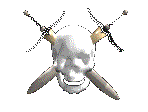


Ship Based Questions And Answers
Q) My Players seem to have an easy time suckering ships by just running up flags to match whatever ship they come across. Am I doing something wrong?
A) The only thing you may be doing wrong is being too kind and generous of a Game Captain. Be more cunning. After all, if the Player Characters can see a ship's flag to know which one to run up themselves to lure it into a false sense of security, that other ship can see them (and their original flag) just as easily. Make the party commit to whatever flag they're flying. Make them consider what waters they're in and take a chance on what flag to fly. Any ship that sees an enemy flag (or no flag at all) will most likely give the party's vessel a wide berth, if not run outright. Catching a ship should require a bit more cunning than just playing match-the-flags.
Q) Does Crew Morale max at 60 or can it go higher than what is listed on Table 38?
A) Crew Morale maxes at 60 and can go no higher. It can only go down from there. This is because pirates can only get so jolly. And 'Extra Morale' is not tallied invisibly, either. For example, if the Crew's Morale was 59, and 5 Morale was earned, they are at 60, not '64', so when next they lose 1 Morale, they are back down to 59.
Q) Why does a compass not offer more than a +1 bonus to Navigation Rolls?
A) A compass points North . . . and pirates are not always trying to find north, are they? Indeed, a compass may tell which direction north is, but it will not identify the surrounding lands, reefs or ships, such as other instruments can, like a spyglass or charts. If this sounds unrealistic, consider that a pirate could be out at sea, surrounded by nothing but horizon, and while a compass he has may point north, he would still have no idea how close he was to land. The compass comes into use in the game in more practical ways, such as if the Characters are lost in the jungle and need to find the coast which they know lies in a general direction.
Q) Help my game group settle this dispute: How reliable or how absolute is the simple trick of flying a different flag to deceive a ship or fort of another nation?
A) It is effective at a distance, say when a ship is first sighted, but otherwise it's simply not enough to fool anyone. Aside from the obvious fact that nobody will go near a ship flying an enemy flag or any ship that changes a flag once sighted, ships are also recognizable in more ways than just the colors they fly. Actually, every individual ship is of a slightly different design, and as they take a long time to construct, they gain reputations and are remembered. In history, there are actually very few documents or guidelines for building ships at all. In our modern times, we tend to think that ships would simply be mass-produced in an assembly-line fashion, but the truth is that each one was a work of art, the designs changing by the month and year to improve their chances in war and with speed against competing designs. All told, even if the flag and name are changed, the basic shape of the ship as well as its more subtle details will be recognized by others, and then they will surmise what flag should be flying, and which one should not.
Q) I read a historical account of pirates actually dismantling small ships and storing them in the cargo holds of larger vessels, to be reassembled later, so can I and if so how do I do this in the role-playing game?
A) Pirates and privateers usually had only one ship and were not skilled shipwrights, but certainly the more enterprising ones (such as Sir Francis Drake) did indeed transport small ships in pieces, and so it can be done. In terms of our game, a ship's Value, multiplied by ten thousand, is the cargo space it takes up amongst however many ships. And, both disassembling and reassembling it takes a total number of man-days equal to the ship's Value multiplied by one thousand.
Q) My crew seems to get lost at sea a lot, despite high Skill Levels and charts. Isn't the system a little unbalanced for ships to get lost so much?
A) The roll of a '1' can happen to anyone, and in Pirates indeed one twelfth of the time, which is part of the flamboyant nature of this particular game. However, it's not all that historically incorrect either, as even the great pirate Henry Morgan wrecked as many as three ships with the equivalent of rolling '1's (he wrecked on reefs twice simply by not seeing them, and once his crew got drunk and just dropped a candle next to the powder kegs . . . it can happen to anyone). While being lost results in little more than a few extra rolls and maybe burning a couple of minutes of game time, it hurts some Players' pride more than their resources aboard ship, and so you may opt to substitute becoming lost at sea with something different, such as forcing a stranger Encounter, an enemy vessel, or some other critical situation. It also helps to keep in mind (and remind one's Players if necessary) that these are pirates and not professional naval officers, and that with good charts and high Skills the chances of being lost between island hopping (as pirates most often did) is virtually nil, while the chances of rolling that '1' increase on long voyages, which pirates seldom (if ever) tried to accomplish, though Players tend to try, underestimating the size of the sea.
Q) If the Player Characters intend to get from one port to another by hiring onto another (NPC) ship to get there, say a merchant ship, do they get paid?
A) NPC ships, indeed merchantmen for the most part, provide the Game Captain himself with more of a relief than the Players by way of saving him calculations, and thus as most everything is already done for the group they receive no benefit beyond the standard sailor's wage, that of 1 gold per Encounter (not per day nor per league of travel).
















